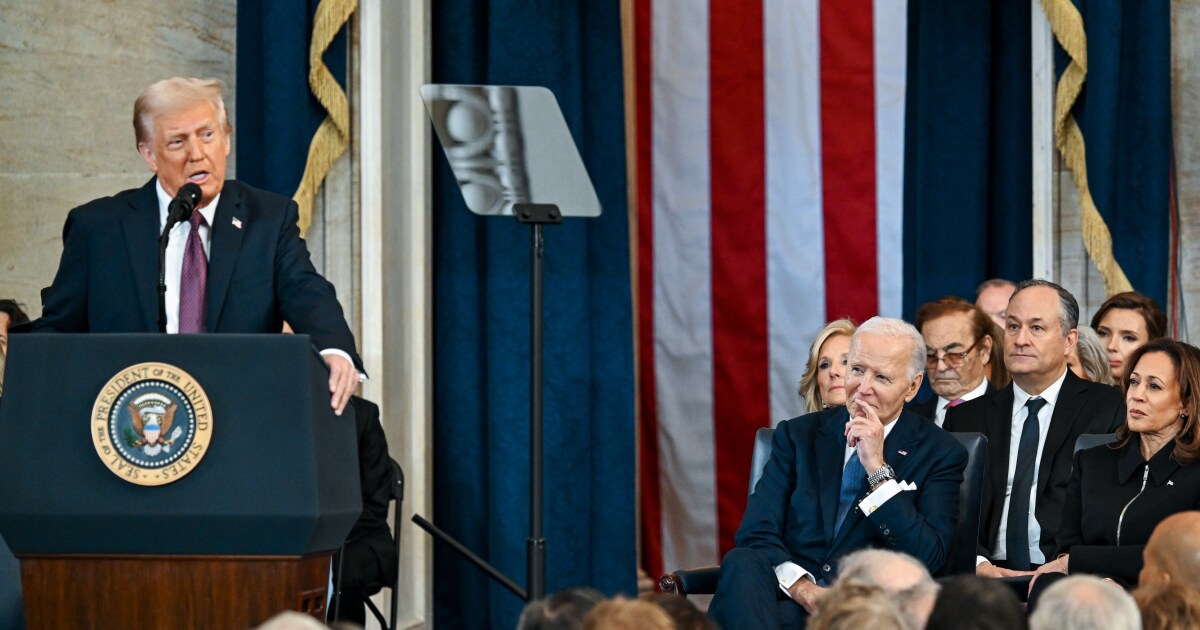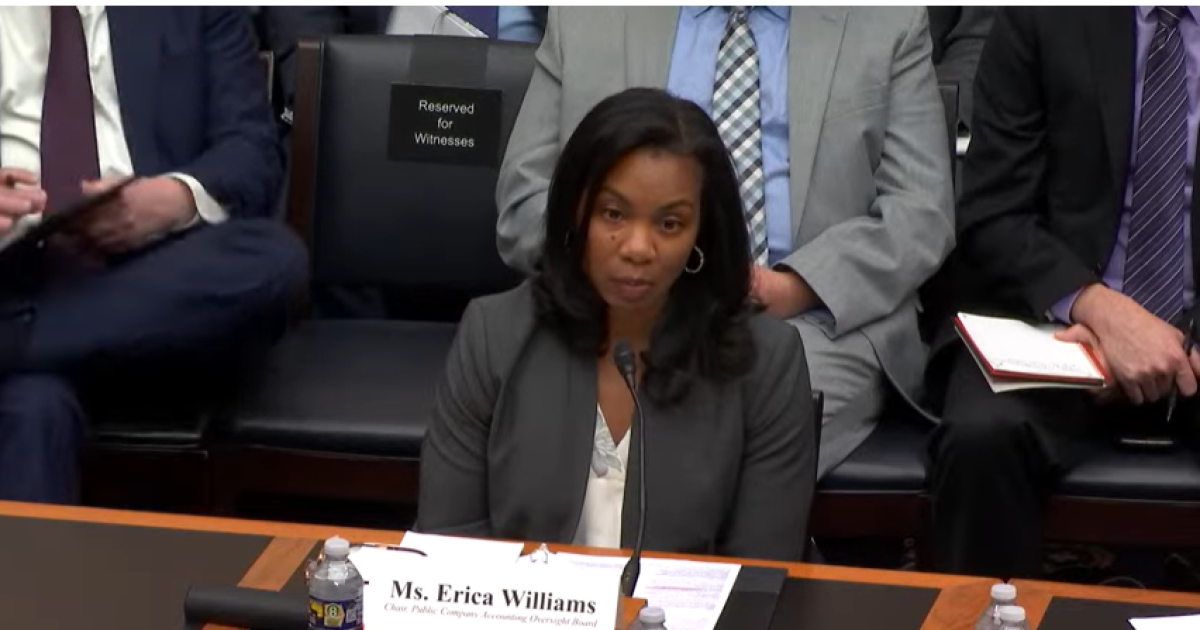Accounting
The regulatory forecast under Trump: Less, and lighter
Published
3 months agoon

Get ready for a very different regulatory environment.
President Donald Trump and his administration have been aggressively overhauling the federal government, with hiring freezes and layoffs, while rolling back rules and regulations at the Public Company Accounting Oversight Board and the Securities and Exchange Commission, as well as threatening to overhaul the Internal Revenue Service and the Treasury Department.
Only a few days after Trump’s inauguration, the SEC
The SEC in general appears to be taking a more industry-friendly approach than under its previous chairman, Gary Gensler, who

Kenny Holston/Bloomberg
AICPA & CIMA president and CEO Mark Koziel
“There are rumors we’re dealing with currently, and Paul Atkins, in his prior stint with the SEC, was already pretty vocal about the fact that he wouldn’t mind seeing the PCAOB be shut down, and anything that the PCAOB does get rolled up into the SEC,” said Koziel. “So that is something that we are working on today in preparation. People have said, ‘Are you for or against PCAOB?’ For us, whatever they decide to do, we’re going to work with whatever regulator we need to work with as a profession to make sure that we’re serving the public interest the way it needs to be.”
More changes at the audit overseer?
Other observers also see the likelihood of a shakeup of the board members at the PCAOB, as happened during the previous Trump administration and again during the Biden administration.
“I suppose it’s probably pretty likely that there will be maybe a complete change in the membership of the board,” said Dan Goelzer, one of the original members of the PCAOB and later an acting chair. “That happened both of the last times around when there was a change in administration. I don’t really say that with any pleasure. I’d rather see a less political PCAOB. But as a practical matter, I certainly think the new SEC would look to change the chair of the PCAOB — I suppose that’s quite likely at least — and some of the other board members as well.”
There may be a restructuring of the PCAOB as well, along with its possible absorption into the SEC. “The other big picture issue is whether broad efforts to restructure or streamline the government are going to include the idea of folding the PCAOB into the SEC,” said Goelzer. “That came up during the prior Trump administration and was actually proposed in one of Trump’s budgets, and it’s in the Heritage Foundation report. I suspect that will come up as a discussion item, at least. Whether it would actually make it through Congress is far from clear.”
The PCAOB was created under the Sarbanes-Oxley Act of 2002, so it would theoretically take an act of Congress to abolish the board. However, other agencies such as the U.S. Agency for International Development and the Consumer Financial Protection Bureau were also created by Congress, yet the Trump administration and Elon Musk’s Department of Governmental Efficiency have nevertheless moved to dismantle them.
The Center for Audit Quality has been watching the changes at the PCAOB and the SEC closely, and CEO Julie Bell Lindsay noted that the SEC will be dealing with the impact of two Supreme Court decisions last year limiting the use of administrative law judges and court reliance on agency regulations under the longstanding “Chevron deference” doctrine. In the wake of those two decisions in the
It’s not clear if the PCAOB will be as busy with rolling out new standards as it was during the Biden administration, especially after
“Over the past couple of years, at the CAQ, we’ve been supportive of the PCAOB modernizing and updating their standards, which have not been updated for 20-plus years,” said Bell Lindsay. “We’ve been supportive of that, but we’re also certainly pointing out areas of concern where we feel that there could be unintended consequences.”
She noted that the CAQ submitted comment letters on nine PCAOB proposed standards and rules, five of which were supportive, and four of which were not. “Generally, when we’ve expressed concerns or have not been supportive of a particular standard from the PCAOB, it really comes down to three different areas of concern,” said Bell Lindsay. “One is the lack of data-driven analysis, where what is the problem trying to be solved is something that we’re focused on. To the extent we can, we have tried to provide data and research to the board to inform the standard-setting process. The second area is lack of cost-benefit analysis. For example, on the NOCLAR proposal, there was not even a cost estimate included in that proposal by the PCAOB. We and other stakeholders in the ecosystem attempted to put together a cost analysis of the proposed standard, but needing to fully understand that is very important.”
The PCAOB and the SEC will probably be expected to provide more rigorous cost-benefits analysis for any new standards, rules and regulations. One of the PCAOB board members, Christina Ho, has
Bell Lindsay would like to see the PCAOB create more outside advisory groups apart from its Investor Advisory Group and Standards and Emerging Issues Advisory Groups so it can consult with a greater variety of outside stakeholders.
As for the SEC, she is hopeful about Atkins becoming chair since she used to work with him while they were both at the SEC. “I had the privilege of serving at the commission when Paul was a commissioner,” said Bell Lindsay. “I was there from 2002 to 2005, so I do know him fairly well. He was there during the standing up of the PCAOB in the mid-2000s. Officially, we’re not sure where Paul is going to stand on things. What I have found is that Paul is very reasonable, and I do believe he appreciates the key role that the public company audit profession serves in the capital markets and the need for effective, transparent oversight of the audit profession.”
Enforcement and inspections
Goelzer anticipates less emphasis on enforcement now at the PCAOB. “One change I would expect is that, at least to my perception, these enforcement programs have become more focused on violations that don’t directly relate to the auditing process or failures in the auditing process — things like filing Form AP on time or not including some participating firm in the Form AP, that type of thing — and then fairly substantial monitoring penalties for those violations,” he said. “I would expect that to change. Enforcement programs might go back more to focusing on what I would call substantive audit failures.”
The SEC and the PCAOB may end up backing away from the stepped-up enforcement seen in recent years under Gensler and PCAOB chair Erica Williams. There may even be a complete
“The current board’s priorities were to use enforcement as a regulatory tool, more standards and more enforcement,” said Jackson Johnson, president of Johnson Global Advisory, a Washington, D.C.-based firm that helps auditing firms navigate the PCAOB inspection process. “The next board will be quite different. The next board will have a more collaborative mindset with firms, more information-gathering with stakeholders, more economic analysis to inform standard-setting, more robust economic analysis to inform standard-setting.”
He acknowledged that the PCAOB had accomplished a great deal under Williams, including the
“For me, what I want for firms will be a period of recalibration and digesting what has been thrown on them over the last couple years through all of these new standards,” said Johnson.
He anticipates a slowdown in rulemaking at the board. “I’m not sure how much of a flurry of new enforcement cases will be brought,” he said. “I think right now, we are going to be for some time in this transitional stage. As soon as some of these board members at the PCAOB depart voluntarily or involuntarily, there will be a lack of a quorum at the board, so there will be a temporary stoppage of action, and that will affect everything from inspection reports to opening investigations. All of those things need a majority board to approve. The last time we did an administrative change, there was a holdup of inspection reports for a while, and it took some time before the PCAOB had a full board back in place. While I’m working on enforcement cases right now, I think when the board starts to shuffle, there might be a period of time where we see a slowdown in new investigations, but frankly, other things too, like new proposed standards and new inspection reports getting issued, because all of these things require a board vote.”
The PCAOB could be returning to its roots in some ways in the new administration. “I think what you’ll see is kind of a return to the core mission,” said Steven Richards, a senior managing director at Ankura in Washington, D.C., who was a previous advisor to the PCAOB and an assistant chief accountant at the SEC. “They’ve been very aggressive in upstaffing. Their budget has gone up, so I think what you’ll see is the commission, through the chair, put some constraints on that kind of stuff, and actually I think you’ll see the budget shrink. I think it will be a return to their core mission around investor protection through high-quality audits. I think you’ll see them focus very much on the inspection program. They’ve had an increase in both fines and case counts, but the majority of the case count increases have been really more compliance-oriented things being turned into enforcement matters that used to go through other processes of the board, like remediation and the inspection division. I don’t think you’ll see that anymore. I think those kinds of cases will go away and go to a different mechanism.”
He believes monetary penalties will go down as well. “You’ll see something around the civil monetary penalties having a better relationship to the conduct,” said Richards. “Before this last administration, penalties were too low, but they swung too far and now they got completely out of hand relative to the type of conduct. I think what you’ll see is a revision more toward the norm and a refocusing on the core mission. The inspection division drives a lot of good audit improvement. I think you’ll see that division continue to function more or less like it has the past, but with much more focus on core audit, the performance of the audit, and probably a little less around some of these other compliance things that don’t have as direct an intersection with poor performance of the audit or the quality control system around it. Generally speaking, the commission is going to control the board through its budget. … I don’t think it’s unlikely that they’re going to have to replace some members of the commission to do that. I think those are most likely: a smaller, leaner, more focused-on-core-mission PCAOB and probably some turnover at the board.”
He doesn’t expect to see the PCAOB folded into the SEC, as was proposed in a bill in 2022 by Rep. Bill Huizenga, R-Michigan.
“I wouldn’t expect that to be at the top of their agenda,” said Richards. “I think more likely what you’re going to see, just because it doesn’t require an active Congress, is control of the direction and priorities of the PCAOB and the SEC through the appropriations and budget process. Both are going to be under pressure, and they’re likely to make some changes at the board level, and that will also bleed out to the organization.”
During a recent AICPA conference, Rep. French Hill, R-Arkansas, and Mark Uyeda, who is now
“The administration’s direction is further underscored by the appointment of Paul Atkins, known for his skepticism of the PCAOB, to SEC chair,” said Jennifer Wood, assurance service line leader at Top 100 Firm The Bonadio Group. “These events reflect a broader shift toward capital formation and reduced compliance burdens. Reduced compliance costs and increased efficiency sound appealing, but there’s also a risk of losing the rigorous oversight that underpins accurate financial reporting and protects the public interest. If managed thoughtfully, a revamped PCAOB could streamline processes and refocus on high-impact areas. However, audit quality, transparency and investor protection are non-negotiables for a thriving financial system, and they must remain front and center as we navigate this transition.”
You may like
Accounting
House tax bill includes provision eliminating PCAOB
Published
3 hours agoon
May 22, 2025

The far-reaching tax legislation that passed early Thursday morning in the House included a provision that would transfer the responsibilities of the Public Company Accounting Oversight Board to the Securities and Exchange Commission, effectively eliminating the PCAOB.
The House Financial Services Committee
PCAOB chair Erica Williams has been
“Like many of you, I am deeply troubled by legislation being considered in Congress to eliminate the PCAOB as we know it,” she said. “This policy idea is not new. It has been around for decades, since the PCAOB was first created in response to Enron, WorldCom and the other accounting scandals of the early 2000s that left devastation in their wake. In the more than 20 years since, the PCAOB, led by its expert staff, has made invaluable contributions to the safety and security of U.S. capital markets. Investors are better protected because of the PCAOB. Audit quality has improved because of the PCAOB.”
Williams pointed out that she used to work for the SEC and is familiar with the agency. “The SEC was my professional home for 11 years,” she said. “I have deep admiration and respect for the incredible professional staff there. They are excellent at what they do. It is different from what we do here at the PCAOB. The unique experience and expertise built up by the PCAOB over decades cannot simply be cut and pasted without significant risk to investors at a time when markets are already volatile.”
She noted that the PCAOB has specific agreements with other audit regulators in countries around the world. “Getting an inspections program off the ground alone would take years,” she said. “It would require hiring hundreds of experienced inspectors and renegotiating agreements around the world, including in China, wasting time and money all while creating significant risk of fraud slipping through the cracks while no one is looking. Not to mention the disruption to enforcement around the world and potential loss of unmatched expertise built by [PCAOB chief auditor Barbara Vanich] and her team at a time when firms are relying on their support to implement new standards.I have said this before, and I will say it again any chance I get: every member of the PCAOB team plays a critical role in executing our mission of protecting investors on U.S. markets. And they are irreplaceable.”
SEC chairman Paul Atkins said at a conference this week that the SEC would be able to take over the tasks over the PCAOB, but would need the extra funding and staff provided under the bill.
“Congress outsourced those tasks to the PCAOB, and it’s up to Congress to decide where they should be housed,” he told reporters, according to
The SEC might also need to bring over staff from the PCAOB with the necessary experience. Atkins said under the bill “we could get the people who are at the PCAOB and be able to consolidate.”
However, a group of former PCAOB officials doubts the SEC could quickly take up those responsibilities and wrote a letter to the House committee, saying, “We are skeptical that the SEC could replicate the PCAOB’s expertise and infrastructure with similar positive results.”
The American Institute of CPAs has been
The AICPA had set auditing standards for public companies until the passage of the Sarbanes-Oxley Act of 2002 created the PCAOB in 2003 and still sets many assurance and attestation standards for private companies. The PCAOB has been working to update many of the older auditing standards it inherited from the AICPA, and former SEC chair Gary Gensler had


Cycles are nothing new in the world of white-collar enforcement, which often impact the perceived importance of corporate governance processes. However, as we say in my other home country, “plus ça change, moins ça change” (the more things change, the more they stay the same!)
Rules tighten in the aftermath of scandal or financial crisis, then loosen in the name of relaxing regulations that stifle innovation, economic growth or administrative priority shifts. Regulatory enforcement intensity waxes and wanes, but the importance of appropriate governance and controls remains critical to corporate well-being.
We now appear to be entering another familiar enforcement phase: a pullback in domestic focus, deeper scrutiny on specific areas, a lighter touch on corporate accountability and greater attention on foreign actors. While this is certainly not unprecedented, this environment raises important questions and challenges about corporate behavior, compliance resilience and the long-term risks of a less stringent enforcement environment.
Like a pandemic, fraud spreads silently at first — thriving in weak systems, exploiting human vulnerabilities and multiplying rapidly before anyone realizes the true scale of the contagion. Just as the Enron and WorldCom scandals
Where the risk may surface first
Certain sectors are especially vulnerable in this type of environment. As well as the more traditionally targeted industries, new areas like crypto and digital assets, which continue to develop ahead of clear regulatory frameworks, are particularly at risk. While high-profile prosecutions have taken place, certain new industry participants still operate in a regulatory gray zone, and investors lack many of the protections common in more mature financial markets.
Often overlooked, environmental claims also deserve attention. If enforcement around environmental disclosures and emissions standards weakens, it could create incentives for companies to exaggerate sustainability efforts or underreport risk. These actions often don’t attract immediate scrutiny — but they can lead to significant liability down the line.
Opportunity: The return of the light-touch era?
Recent developments suggest a clear change in tone from federal regulators. Penalties are being moderated in some cases, deferred prosecution agreements seem to have less teeth, and monitoring remedies may be refocused. While enforcement has not disappeared — nor is it likely to — its domestic focus appears to be narrowing. At the same time, there’s greater emphasis on foreign companies and overseas corruption and there are signals that
For today’s financial and compliance leaders — many of whom may not have been in senior roles during prior enforcement waves — this could seem like a reprieve. But it may also create blind spots. When rules seem less urgent or enforcement risk feels more distant, some organizations deprioritize the very controls and practices that help them navigate.
The past reminds us that such lulls can create fertile ground for misconduct, especially if companies start to believe that scrutiny is less likely, or consequences will be delayed.
Here’s a simple equation: Economic Pressure + Relaxed Oversight = Increased Fraud Risk.
At the same time, macroeconomic signals point to uncertainty. If economic headwinds intensify — especially with recessionary concerns, uncertainty around tariffs, extended and disrupted supply chains leading to margin compression — companies may feel increasing pressure to meet or maintain performance expectations. In such a climate, the line between aggressive accounting and earnings manipulation can start to blur and the need to gain market share may lead to bribes, among other malfeasance.
Misconduct in these environments rarely becomes visible right away. It builds quietly over time, often uncovered only years later during internal audits, in the aftermath of bankruptcies when performance was stretched to the breaking point, in the case of restatements, or as a result of a whistleblower. The risk may not be immediately visible — but it is cumulative and real.
The guardrails that remain
That said, several key safeguards are still intact — offering a measure of counterbalance even as federal enforcement evolves:
- International enforcement continues to expand. Regulators abroad are increasingly assertive, particularly in Europe and Asia. U.S.-based companies operating globally are still subject to foreign anti-corruption laws and cross-border cooperation among authorities is increasing.
- Domestically, state attorney generals can fill some of the gaps.
Many AGs have a long history of stepping in — particularly in areas like health care fraud, consumer protection and investor rights. But these offices may lack the scale, budget and investigative horsepower of federal agencies. - Federal action continues in targeted areas. Enforcement efforts remain active in sectors like health care, particularly in cases involving government reimbursement fraud or improper billing practices. These cases suggest that federal oversight has not disappeared — just narrowed in focus.
- Auditing standards are as demanding as ever. Despite other regulatory changes, public company auditors remain under pressure to detect fraud and report weaknesses. Regulatory expectations in this area have not been relaxed, and auditors are increasingly expected to identify red flags in financial statements.
- Private litigation remains a meaningful deterrent. Shareholder lawsuits and class actions continue to hold companies accountable when disclosures fall short or risks are misrepresented. This legal pressure — driven by investors and plaintiffs’ attorneys rather than government — operates independently of political cycles.
- Whistleblowers are still protected and can be highly incentivized. Tipsters have played a key role in uncovering many recent frauds, and protections for whistleblowers remain strong. In a lower-enforcement climate, their role becomes even more important.
Compliance programs: Relevance beyond enforcement
Many organizations have made real strides in strengthening internal compliance programs over the past decade — driven by regulatory pressure, investor expectations and reputational concerns. Even in a less stringent enforcement environment, these investments remain vital.
First, reputational risk and public accountability haven’t faded. In fact, social media and stakeholder activism make it easier than ever for ethical lapses to attract attention — even without government involvement.
Second, mergers and acquisitions continue to present risk. Acquiring entities are often held responsible for inherited compliance failures. Robust internal controls, due diligence and risk assessments are essential for identifying hidden liabilities before they become public problems.
Finally, even in the absence of immediate enforcement, forward-thinking organizations understand that compliance isn’t just about staying out of trouble. It’s about building sustainable operations, maintaining trust with stakeholders, establishing a reputation of integrity and anticipating risk — not reacting to it.
A moment to be proactive
As enforcement priorities shift, the temptation to loosen internal controls or scale back compliance efforts and investments may be tempting. But this moment is not one for complacency. If history is any guide (and it usually is), misconduct that begins under light scrutiny tends to end under a more intense spotlight — often years later.
Strong compliance programs can stop the spread of fraud before it takes hold, building organizational immunity through vigilance, accountability and early detection. This is a time to take stock:
- Are controls over financial reporting keeping pace with business complexity and the evolving new risks created by change in policies, and geopolitical uncertainty identified?
- Are new risks — especially in fast-evolving unregulated sectors — being properly identified, assessed and mitigated?
- Are compliance programs appropriately resourced and empowered to act?
These are the questions worth asking now, before risk has a chance to compound.
The enforcement cycle may be reprioritized, but risk itself hasn’t gone anywhere. Economic pressures, evolving industries and shifting regulatory priorities all create new vulnerabilities. And while some external guardrails remain in place, they are no substitute for proactive, internal risk management.
Those who treat this moment as a time to reinforce — rather than retreat from — strong compliance will be better positioned to navigate whatever comes next. Because while enforcement climates may rise and fall, the consequences of ethical failure are always significant, often lasting — and sometimes, fatal.
Accounting
Trump tax bill faces Senate’s arcane rules, desire for changes
Published
5 hours agoon
May 22, 2025

The Republican legislative balancing act now shifts to the Senate.
Senate Majority Leader John Thune (R-South Dakota) said this week House Republicans would like to see as few changes as possible to the sweeping tax and spending package (
“The Senate will have its imprint on it,” said Thune.
Indeed, GOP senators have their own demands, and the package will have to survive the chamber’s complex rules — a historically time-consuming process.
Byrd Rule issues
The reconciliation process allows tax and spending legislation to pass with a simple majority, but the bill still needs to survive the Byrd Rule — named after the late Sen. Robert Byrd (D-West Virginia), known for his mastery of parliamentary procedure. It prevents lawmakers from tucking non-budgetary provisions into the legislation.
“The committees are working closely to try and identify potential Byrd problems ahead of time,” Thune said.
The Senate parliamentarian makes calls on challenges against provisions in the bill and whether they survive the “Byrd Bath.” Democrats plan to aggressively use the rule to challenge items they believe don’t satisfy the Byrd standard. Once the package makes it to the floor, senators will be prepared for a marathon vote-a-rama on amendments.
GOP senators hope the advance work will help keep the measure moving, but a look at the history of the chamber’s experience with big bills shows it will likely be a lengthy process.
For the reconciliation bills enacted since 1980, the time between adoption of a budget resolution and enactment of the reconciliation bill ranges from 28 to 385 days, with a 152-day average, according to the
Independence Day target
“It will take longer than expected just because it is arduous and it’s designed to be that way,” Sen. Mike Rounds (R-South Dakota) said. “It would be great to get it out before the Fourth of July break.”
Majority Whip John Barrasso (R-Wyoming) said the Senate Finance Committee has been meeting since last summer and “have some ideas that may or may not be in the House bill.” Barrasso said he’ll work with every member of his conference, calling Trump and Vice President JD Vance persuasive members of the whip team as well.
Congress didn’t clear Republicans’ 2017 tax overhaul until December of that year, Barrasso said, but this bill faces a tighter deadline because it includes a debt ceiling hike. The borrowing limit could hit as soon as August.
Sen. John Hoeven (R-North Dakota) said the message to Senate Republicans right now is to work with committees of jurisdiction.
“Whatever committee you’re on, work with your chairman on your committee, is really where we’re at,” Hoeven said.
Thune originally proposed moving the measure in two parts, but Trump wants his agenda rolled into a single package, which the House dubbed “The One Big Beautiful Bill Act.” Sen. Ron Johnson (R-Wisconsin) is still advocating for the previous approach.
Asked when the Senate could get it done, Johnson said, “We are so far away from an acceptable bill, it’s hard to say.”
“I think we could move very quickly if we split it into two.”
Next steps
If the Senate amends the reconciliation legislation, the House would need to vote on the amended legislation or they would need to be reconciled in a conference committee. That’s likely to lead to more challenges, given the tight margins in the House.
Rep. Chip Roy (R-Texas), one of the most vocal conservative hardliners who ended up supporting the bill, acknowledged Senate changes are coming and suggested tough negotiations lie ahead between the chambers.
“We’ll give them some flexibility, they gotta work their will, but somewhere between us and the Senate and the White House, there’s gonna be some red lines and those will be public pretty soon,” Roy said.

Stocks making the biggest moves after hours: INTU, WDAY, ROST, DECK

House tax bill includes provision eliminating PCAOB

Ray Dalio says to fear the bond market as deficit becomes critical

New 2023 K-1 instructions stir the CAMT pot for partnerships and corporations

The Essential Practice of Bank and Credit Card Statement Reconciliation

Are American progressives making themselves sad?
Trending
-

 Economics1 week ago
Economics1 week agoCPI inflation April 2025: Rate hits 2.3%
-

 Personal Finance1 week ago
Personal Finance1 week agoHouse Republicans advance Trump’s tax bill. ‘SALT’ deduction in limbo
-

 Economics1 week ago
Economics1 week agoViolent crime is falling rapidly across America
-

 Economics6 days ago
Economics6 days agoThe low-end consumer is about to feel the pinch as Trump restarts student loan collections
-

 Personal Finance1 week ago
Personal Finance1 week agoHow to save on groceries amid food price inflation
-

 Economics1 week ago
Economics1 week agoGerman business leaders tell new government: It’s time to deliver
-

 Economics1 week ago
Economics1 week agoAre American Catholics ready for an American pope?
-

 Economics1 week ago
Economics1 week agoEmbrace the woo woo
